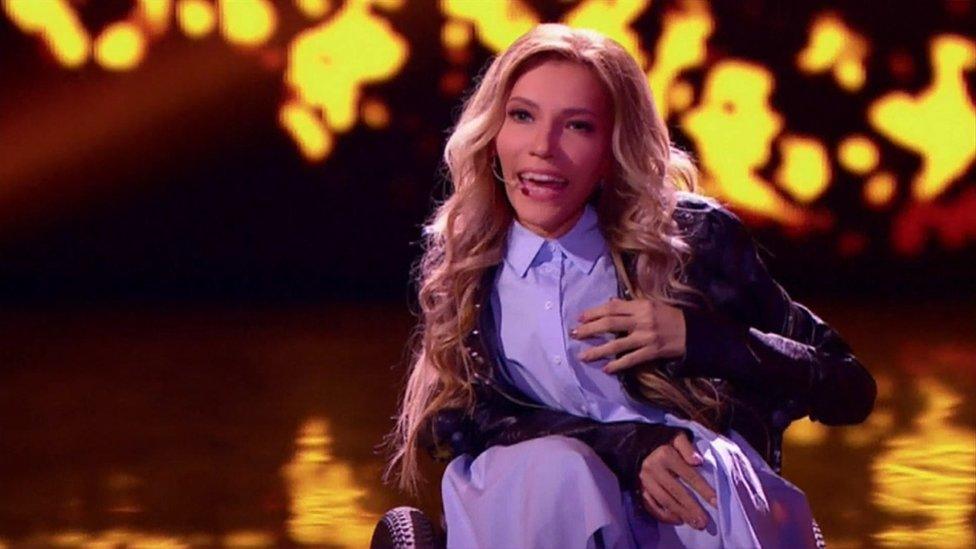Eurovision on front line: Will Russia's absence spoil Ukraine's party?
- Published
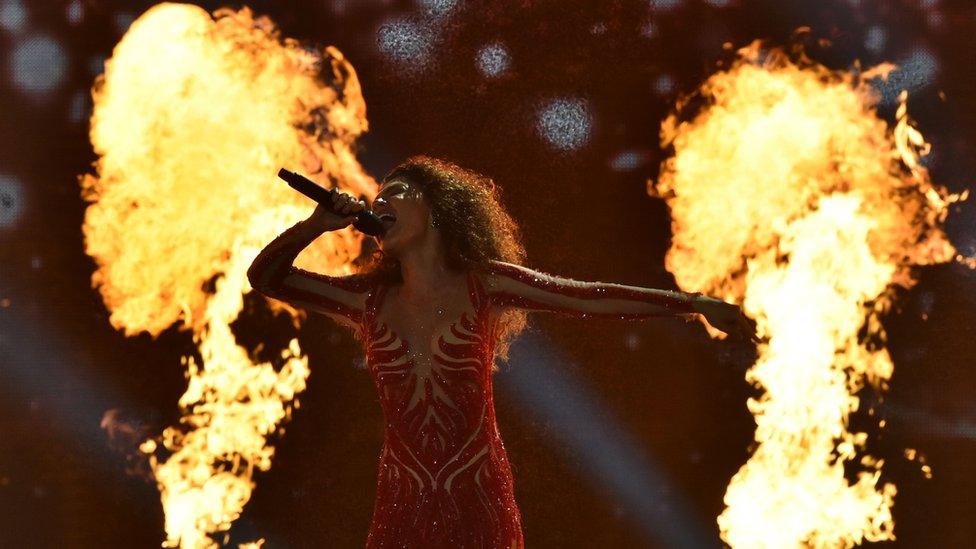
Playing with fire? Georgia's singer will take full advantage of Eurovision pyrotechnics in Tuesday's semi-final
Performers from 42 countries strode down a long red carpet near Ukraine's parliament this week, as a curtain-raiser to this year's Eurovision Song Contest.
But one nation, Russia, was missing.
For the first time in Eurovision history, the host nation barred another country's singer.
That is because in 2015, in violation of Ukrainian border rules, Russia's Julia Samoilova performed in Crimea, the Ukrainian peninsula annexed by Russia a year earlier.
Why this Russian singer won't be in Kiev this year
Samoilova suffers from a neural muscular disorder and has used a wheelchair since childhood.
"When the rumours began I might not go, I was so sad," she told the BBC in Moscow. "I thought, how come? This was my dream. When the final decision was taken I didn't believe it. But unfortunately, this is the reality."
Crimea or bust - Steve Rosenberg's long journey to annexed peninsula
"I think it's a stupid reaction," Russian MP Vitaly Milonov tells me. "They're even afraid of such a small girl to enter Kiev."
Even before Ukraine's ban, Mr Milonov had called for a Russian boycott of Eurovision: "Eurovision became a disgusting socialist nightmare for all these left-wing parties with all their bearded women, or men, with these anti-Christian positions.
"I am sure that most conservatives in the world will never attend this festival. Because this is a festival of Sodom and Gomorrah."
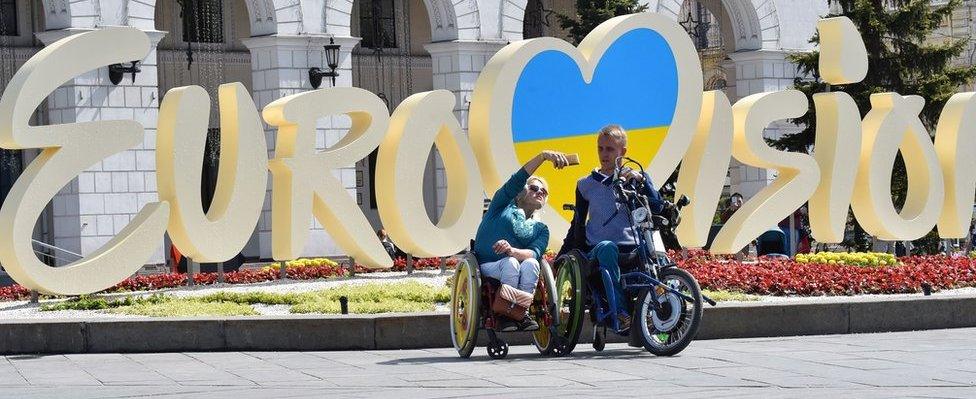
The theme of this year's contest is "Celebrate diversity" but that has fallen flat for Russia
It is supposed to be a festival of peace and friendship but there is not much sign of either in relations between Kiev and Moscow.
In eastern Ukraine, 10,000 people have been killed in three years of war: a war in which Russia is directly involved through its military support for separatist rebels. Crimea remains a source of tension and Eurovision is the latest battleground.
"Since 2014, we've had a law in Ukraine that punishes people who illegally cross our border when they visit Crimea," says Ukrainian MP Olha Chervakova.

"Did Russia know this? Of course. Did Russia know that Julia Samoilova would fall foul of this law? Of course. In other words, entering her in the contest was a conscious provocation to create a huge political scandal."
The ban created a huge headache for Eurovision organisers, the European Broadcasting Union (EBU).
Eurovision's Executive Supervisor Jon Ola Sand said in March that Ukraine's decision went "against both the spirit of the contest and the notion of inclusivity that lies at the heart of its values".
In an unprecedented move, the EBU offered Russia the chance to take part by satellite from Moscow.
Russia declined: after the dramas of last year's Eurovision, Moscow was in no mood to compromise.
Did Ukraine play politics with Eurovision?
Ukraine's 2016 winning entry, 1944, sung by Jamala, was about Joseph Stalin's deportation of Crimea's Tatar population.
Russia had argued that Jamala's song broke contest rules for being of a political nature. When it won, Moscow cried foul and said there was politics at play. Now Russia seems determined to make not only Ukraine look bad, but the entire Eurovision Song Contest.
Recently, two Russian pranksters - posing as Ukraine's prime minister and his assistant - released online a telephone conversation they had recorded with a woman they claimed was EBU Director General Ingrid Deltenre.
If this is the voice of the EBU's top official, it is hugely embarrassing for the EBU, because the woman on the recording makes an astonishing admission about Ukraine's winning song: "I was just too late made aware of the song.
"If I would have been earlier, and I think it was on purpose, I would have not allowed the song to participate, to be very transparent."
In a statement, the EBU said it would "not comment on prank calls".
But these are high-profile Russian pranksters, who once fooled Elton John into thinking he was talking to Russian President Vladimir Putin.
"Now our people don't trust Eurovision any more," one of the pranksters, Alexei, told me. "People understand that any country can use their political goals to win, so it's not a fair contest anymore."
Perhaps this is not just about a song contest? Or Russia's relations with Ukraine?
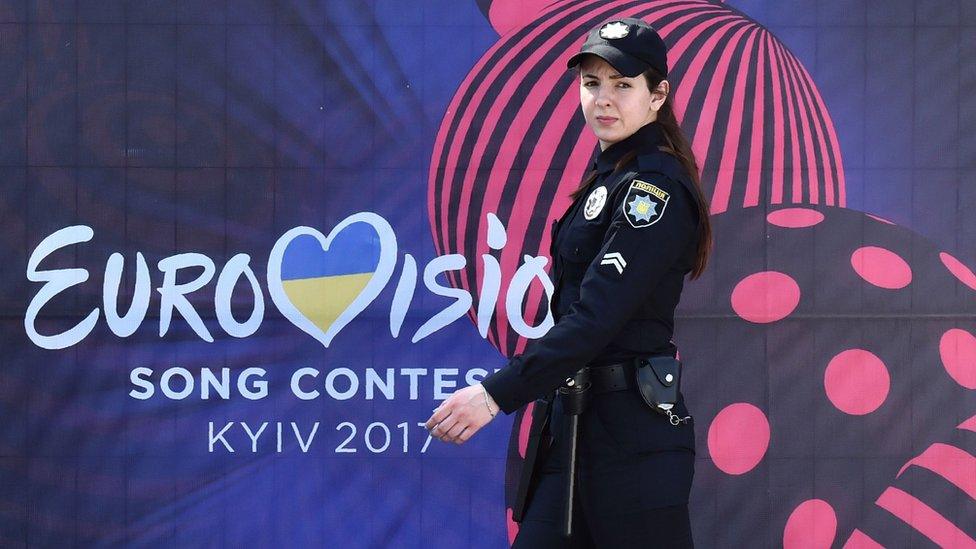
Security is tight for this year's Eurovision and some fear that Russia will somehow make its presence felt
Equating Eurovision with Sodom and Gomorrah and embarrassing the EBU appear part of a wider pattern of Russia trying to undermine Western institutions and Western liberal ideas.
"Russia now defines itself in its social and societal model against the West," believes Jan Techau of the Richard Holbrooke Forum at the American Academy in Berlin. "The Kremlin explicitly portrays Russian society as a counter model to the corrupted West. They seem now to buy completely into the idea that whatever harms the West is good for Russia: a classic zero-sum game."
In the run-up to this year's contest, singer Jamala warned that "we should expect more provocations [from Russia] because our victory hurt them a lot."
Security in Kiev is tight ahead of the first semi-final.
As for Julia Samoilova, instead of singing at Eurovision this week, she will be performing - once again - in Crimea. Another political message from Moscow, to Kiev and to Europe.

Who is Yulia Samoilova?

Russian singer Julia Samoilova has been denied a visa to perform in Kiev
Born in April 1989 in Ukhta, Russia, Julia Samoilova suffers from spinal muscular atrophy, a neuromuscular disorder that causes muscle wastage
She has been in a wheelchair since childhood
A Russian X Factor finalist in 2013, she performed at the Sochi Winter Olympics opening ceremony in 2014
- Published23 March 2017
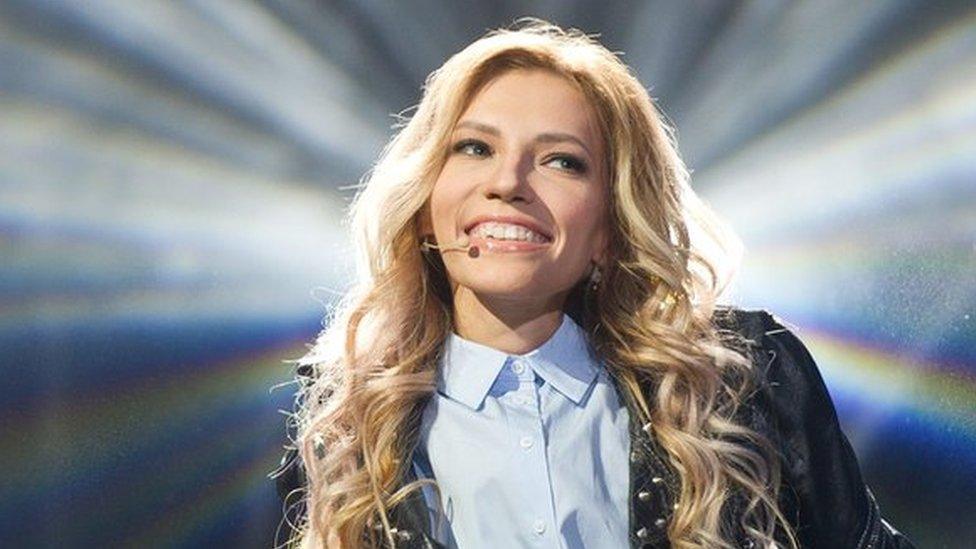
- Published3 March 2017
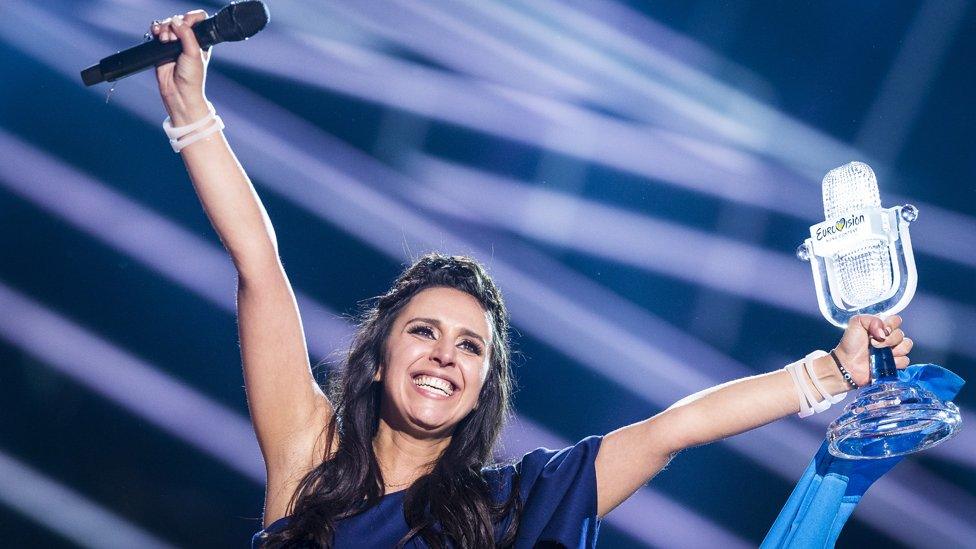
- Published22 March 2017
